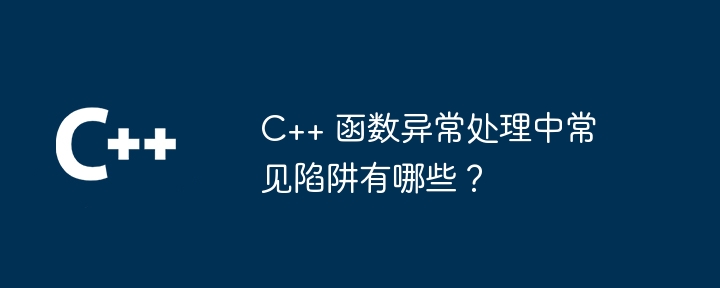
C Common pitfalls in function exception handling: Avoid returning local variable references or pointers in exception handling blocks to avoid pointing to invalid memory. Do not throw exceptions repeatedly in the exception handling block to avoid overwriting the original exception information. Use the noexcept specifier with caution to ensure that the function does not throw an exception. Use smart pointers and exception specifications to improve safety and avoid dangling pointer problems.

Common traps in C function exception handling
Practical cases
Assumptions There is a function doSomething(), which may throw MyException Exception:
void doSomething() {
if (condition) {
throw MyException();
}
// 其他代码
}Trap 1: Returning a reference in the exception handling block
Problem: If a reference to a local variable is returned in the exception handling block, when the function exits, the reference will point to invalid memory.
Code example:
string& getSomething() {
try {
string s = "Hello";
return s; // 引用局部变量 s
} catch (exception& e) {
// 处理异常
}
}Trap 2: Returning pointer in exception handling block
Problem:Similar to Trap 1, if a pointer to a local variable is returned in the exception handling block, the pointer will point to invalid memory when the function exits.
Code example:
int* getSomething() {
int n;
try {
n = 10;
return &n; // 返回局部变量 n 的指针
} catch (exception& e) {
// 处理异常
}
}Trap 3: Throwing exceptions repeatedly
Problem:If Throw another exception again in the exception handling block, and the information of the original exception will be overwritten.
Code Example:
void doSomething() {
try {
throw MyException();
} catch (MyException& e) {
throw logic_error("New error"); // 重新抛出另一个异常
}
}Trap 4: Abusenoexcept
Problem: If a function is signed with the noexcept specifier but may actually throw an exception, the program may crash.
Code Example:
void myNoexceptFunction() noexcept {
throw MyException();
}Precautions
noexcept: Use noexcept only if the function really does not throw any exceptions. std::shared_ptr to avoid dangling pointer problems. The above is the detailed content of What are the common pitfalls in C++ function exception handling?. For more information, please follow other related articles on the PHP Chinese website!
 What are the differences between c++ and c language
What are the differences between c++ and c language
 Recommended learning order for c++ and python
Recommended learning order for c++ and python
 Cost-effectiveness analysis of learning python and c++
Cost-effectiveness analysis of learning python and c++
 Is c language the same as c++?
Is c language the same as c++?
 Which is better to learn first, c language or c++?
Which is better to learn first, c language or c++?
 The difference and connection between c language and c++
The difference and connection between c language and c++
 C++ software Chinese change tutorial
C++ software Chinese change tutorial
 Cost-effectiveness analysis of learning python, java and c++
Cost-effectiveness analysis of learning python, java and c++




